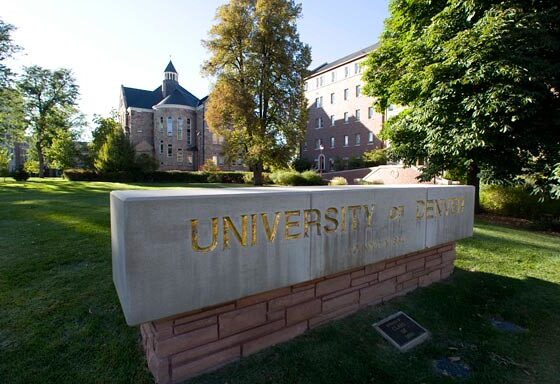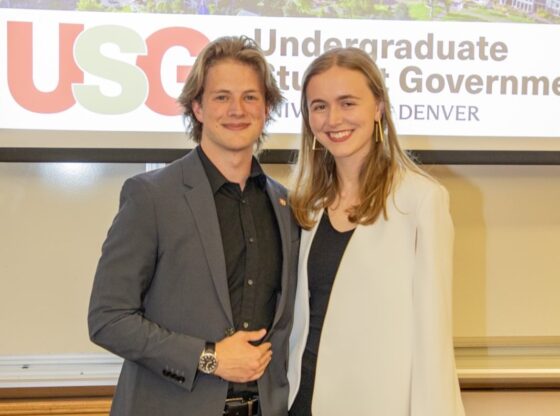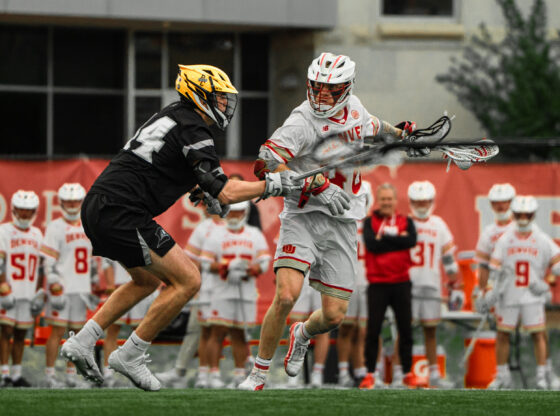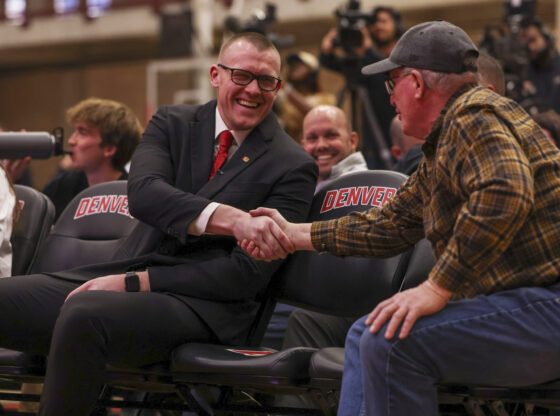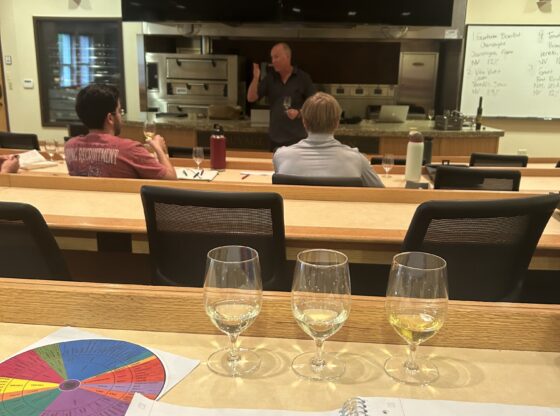 Photo by: Office of the Dean of DCB
Photo by: Office of the Dean of DCB
Dr. James Griesemer, dean of the Daniels College of Business, who announced his resignation in Feb., will serve until a new dean is appointed, probably this fall.
“We were all dreading the notion he would step down at some time. He has done a really wonderful job as the leader of Daniels for the past 10 years. The college is positioned very well,” said Provost Robert Coombe.
In the letter of resignation, Griesemer said, “I thought the time was appropriate for me to step down from the dean’s position, while remaining an active part of the community in a faculty role that will keep me connected to the college and the university and allow me to continue to support Daniels and DU.”
Having taught at many other universities, including the University of Colorado, Griesemer will accept his first teaching position at DU, in strategy and leadership.
Griesemer looks forward to being able to “spend more time becoming much closer with students,” something he feels he has missed with the position as dean.
“I’m going to stay at this college and teach, and I want to do some more writing. I love DU, and want to continue to be a part of it,” Griesemer said.
Griesemer has currently written two books, “Budgeting for Results” concerning budgeting and financial strategy and a technical book, called “Microcomputers and Local Government.” He also has been conducting a series of seminars for the Association to Advance Collegiate Schools of Business, for other deans, on strategic management.
While all of these factors contributed to his resignation, Griesemer also said, “I think 10 years is a fair amount. Leadership is something you should act on, not hold on to, something that should be passed at the appropriate time.”
Griesemer was hired late in 1989, by Daniel Ritchie, to accept the position of vice chancellor for financial affairs.On July 1, 1994 he accepted the position of dean of DCB.
The school was experiencing financial problems and a steady 10-year decline in both graduate and undergraduate enrollment.
Griesemer spent the summer of 1994 meeting with nearly every faculty member at DCB, to find out their view of the business school.
From these meetings he formulated a few objectives for the college. First, he wanted to build an organization to match the quality of the faculty, as he concluded, “the support organization surrounding the faculty was not nearly as good as the faculty itself.”
He also wanted to raise the college’s academic standards, raise the visibility of the school, and equalize class size.
By setting a maximum of 25 students in specialized classes and 35 in core classes, Griesemer was able to finance his new plans from the inside out.
During his 10-year position as dean, DCB has seen a 70 percent increase in enrollment. Students at DCB were given a $24 million headquarters, now a debt-free building, with Griesemer raising almost $70 million in endowment. Average GPA and GMAT scores have risen almost every year.
Griesemer also hired a CFO for the College and created a Career Placement Office. To increase school visibility, he also hired personal relations and marketing specialists.
He referred to Daniels as the West’s “best kept secret” because of the quality of its faculty, but little recognition.
In 2003, DCB entered the Wall Street Journal rankings at number 44. U.S. News ranked the college 100th in 2003, and it moved up 20 places to 80th in 2004.
However, just as he is seeing many of his objectives take root, Griesemer is most proud of “the culture created within the school of both collaboration and excellence.”
He said, “We really see the world as a place where success is achieved through collaboration rather than competition. The culture among the DU faculty is very collaborative, unlike most schools that function around competition.”
Griesemer has facilitated this culture through his revolutionary work in team classes.
Griesemer also gives back to the school financially. In 2003, he became part of the Chancellor’s Society, which encompasses donors of $2,000 to $4,999.
Griesemer received his bachlor’s and master’s degrees from Northern Illinois University. He was city manager for a variety of regions in the United States including Florida, New Jersey, Illinois, and Aurora, Colo. He obtained his doctorate in Public Administration from the University of Colorado.
“I’ve thought more about what I will have the opportunity to do, and less about what I won’t have the opportunity to do,” said Griesemer.
He will miss most “the chance to set the direction.”
He encouraged the future dean to “appreciate the quality of the people in the college” and to “catch the momentum of the place.”
Provost Coombe has put together a selection committee for the new dean, as the position reports to him, but he will not appear on the committee himself.
The first meeting was last Friday, at which there was a general discussion of the interview and application process and what kind of a person they will be looking for.
Coombe said that the new position “will be a key appointment for the university.” He predicted a turnover in the DCB faculty within the next five to 10 years, and stressed the importance that the new dean “manage that well by recruiting first class people.”
He must also continue the devotion to interaction between the College and businesses within Colorado, nationally, and internationally, and increase international networking. Coombe said, “All of those good things can happen.”
Scott Reiman, a member of DU’s Board of Trustees, will be the chair of the 14 member committee, which will include faculty and staff, business leaders, deans, and students.
Many students were nominated to appear on the board but Jaime Conry and Ben Burke, two AUSA senators, will represent the student body.
The business leaders were selected from DCB’s Executive Advisory Board, and are largely from the Denver community.
Jaime Conry, DCB senator and co-chair of Finance for the senate, was asked to appear on the committee. She said, “It says a lot of the Daniels College of Business that they would ask for representation of students on the committee, showing their concern for the students and how much they value the opinion of the students in their college.”




